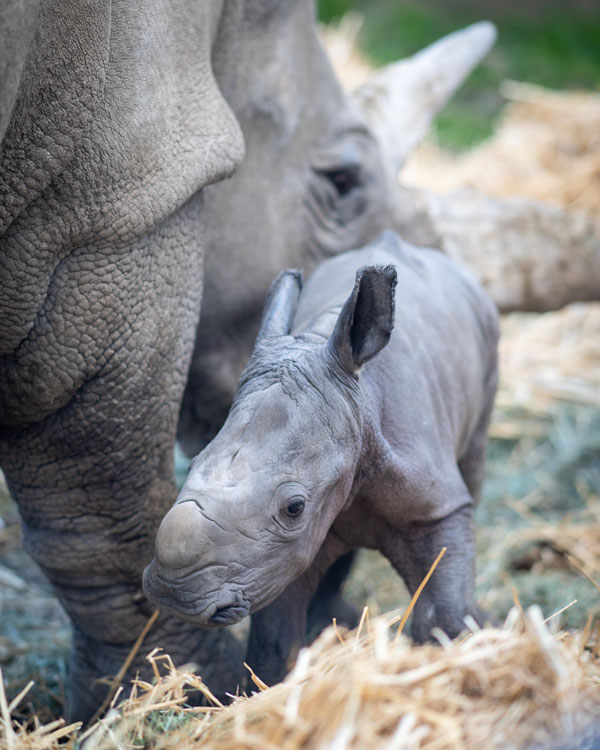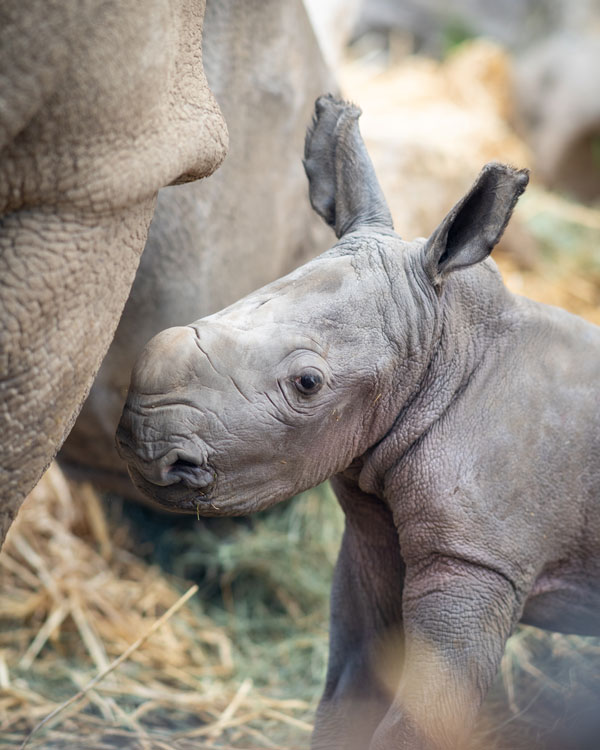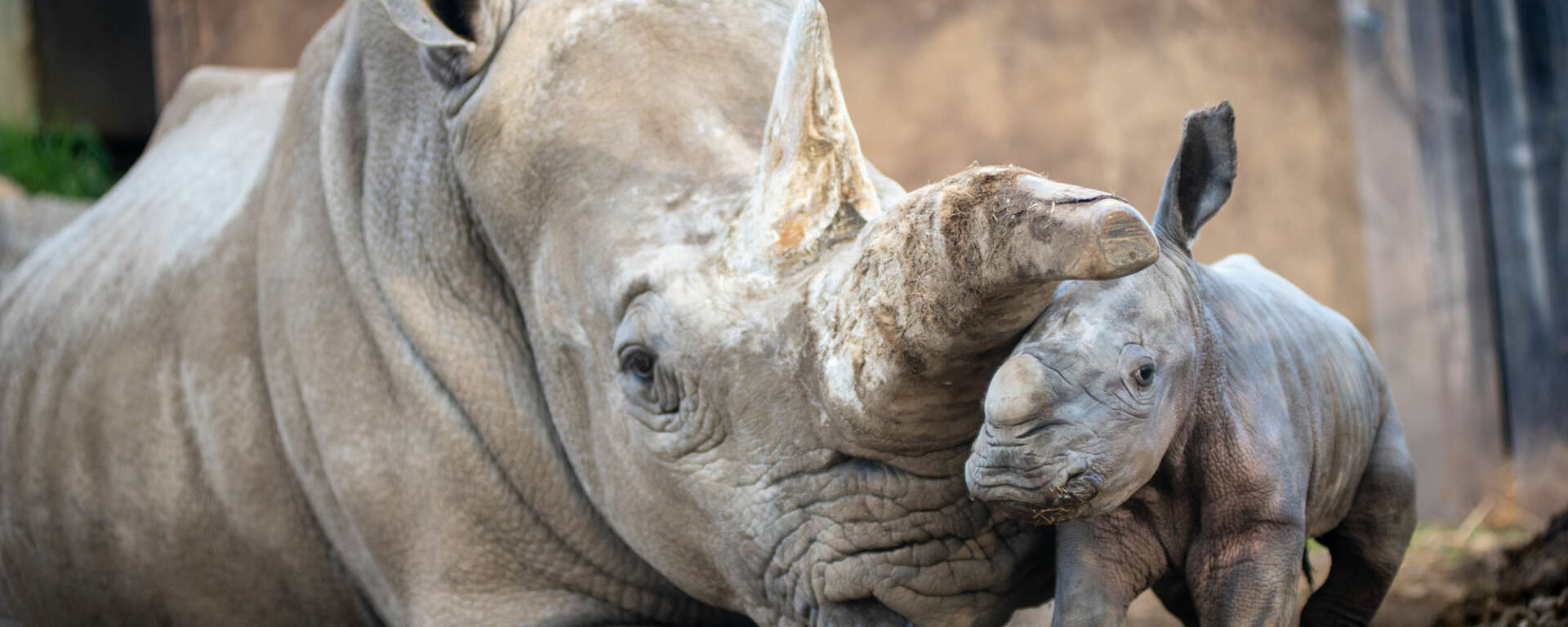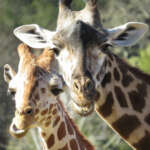Historic first-ever white rhino baby born at Safari West
Posted in: Baby Animals, Goings on, News
Cute Baby Rhino Alert!
Sound the (rhino) horns! Safari West is overjoyed to announce the birth of our first-ever Southern white rhino baby born to mother, Eesha, and father, Ongava.
The calf was born on Sunday, April 2nd at 5:30 pm PST. We feel fortunate and honored to contribute to the growth of global rhino populations and aid in conserving this magnificent protected species.
Our extraordinary animal care staff report the bouncing baby rhino calf is strong, nursing, and is bonding well with Mom. Safari West Veterinarian Dr. Emily Cehrs estimates the baby weighs around 100 pounds. We have not named the new baby yet!
This is a momentous event for us as the calf is the first of its species to be born at Safari West, Needless to say, it is a big deal to Eesha as well! She immediately showed good mothering instincts and has been attentive to her calf.

Photo: Nate Woodward

Photo: Nate Woodward
The story of this remarkable baby calf birth started in the summer of 2008 when Eesha arrived at Safari West. Over the last 15 years, Eesha has been a living reminder to tens of thousands of excited visitors of the plight rhinos face in the wild, and the amazing organizations working to sustain and grow rhino populations. For years we hoped Eesha might contribute to the growth of rhino populations herself, but she never showed much breeding interest in the male rhinos at Safari West.
All that changed in 2021 when Eesha was introduced to a new male named Ongava. Yes, she finally met her Mr. Rhino-right! They instantly were smitten with each other, displaying the assertive behaviors often seen in rhino courtship. Sure enough, throughout 2022, we started seeing increasing signs of pregnancy.
With a 16 – 18 months gestation, patience was critical while waiting for the baby rhino to arrive. In these last few days before birth, our rhino care team took turns staying overnight to ensure Eesha and the baby would have support, no matter when the calf was born.

Current Southern White Rhino Research by Erika Defer
Part of our responsibility of housing animals under human care is to expand our knowledge of these animals to continuously improve their well-being, especially for a keystone species such as the southern white rhinoceros. One of the major ways we accomplish this is through scientific research. Safari West has a research committee comprised of members with wide-ranging backgrounds, each with their own set of expertise. Through this committee we are able to participate in a variety of research projects that allow us to advance scientific knowledge in zoological facilities, improve the well-being of the animals in our collection, and provide a better understanding of native wildlife that lives on the Safari West property.
Safari West is participating in a collaborative research project conducted through the American Institute of Rhinoceros Science (AIRS), an organization led by expert rhino scientists. With this research project, AIRS aims to advance the science of rhino husbandry through nationwide participation. Safari West is proud to be able to contribute to this research that is investigating physical fitness, reproduction and well-being. Through positive reinforcement training, both of our rhinos, Eesha and Ongava, have voluntarily participated in blood draws, wearing anklet activity trackers and providing heart rate, bioimpedance and morphometric measurements. We started our involvement in this collaborative research before we had confirmation of Eesha’s pregnancy. Southern white rhinos can be challenging to successfully breed under human care, especially if the herd size is small, as is the situation we have at Safari West with just one male and one female. Due to the success of their breeding, the data provided will be much more informative to the well-being of southern white rhinos under human care.
In addition, Safari West is conducting our own, internally driven, research project related to behavior and reproduction utilizing thermographic imaging. We have anecdotally seen evidence that supports the ability to detect and monitor pregnancy in our female southern white rhinoceros by monitoring changes in heat signatures through the use of thermography. We are able to utilize the test results from voluntary blood draws and data from behavioral observations to support the changes we are seeing in the thermographic images. The use of this technology could translate to research done in situ, as it allows for non-invasive data collection. We plan to continue this research project after Eesha has her calf, to ascertain the use of thermographic imaging to monitor estrus cycles in southern white rhinos and, hopefully, repeat the research if Eesha successfully breeds again!
- Rhino Research
Part of our responsibility of housing animals under human care is to expand our knowledge of these animals to continuously improve their well-being, especially for a keystone species such as the southern white rhinoceros. One of the major ways we accomplish this is through scientific research. Safari West has a research committee comprised of members with wide-ranging backgrounds, each with their own set of expertise. Through this committee we are able to participate in a variety of research projects that allow us to advance scientific knowledge in zoological facilities, improve the well-being of the animals in our collection, and provide a better understanding of native wildlife that lives on the Safari West property.
Safari West is participating in a collaborative research project conducted through the American Institute of Rhinoceros Science (AIRS), an organization led by expert rhino scientists. With this research project, AIRS aims to advance the science of rhino husbandry through nationwide participation. Safari West is proud to be able to contribute to this research that is investigating physical fitness, reproduction and well-being. Through positive reinforcement training, both of our rhinos, Eesha and Ongava, have voluntarily participated in blood draws, wearing anklet activity trackers and providing heart rate, bioimpedance and morphometric measurements. We started our involvement in this collaborative research before we had confirmation of Eesha’s pregnancy. Southern white rhinos can be challenging to successfully breed under human care, especially if the herd size is small, as is the situation we have at Safari West with just one male and one female. Due to the success of their breeding, the data provided will be much more informative to the well-being of southern white rhinos under human care.
In addition, Safari West is conducting our own, internally driven, research project related to behavior and reproduction utilizing thermographic imaging. We have anecdotally seen evidence that supports the ability to detect and monitor pregnancy in our female southern white rhinoceros by monitoring changes in heat signatures through the use of thermography. We are able to utilize the test results from voluntary blood draws and data from behavioral observations to support the changes we are seeing in the thermographic images. The use of this technology could translate to research done in situ, as it allows for non-invasive data collection. We plan to continue this research project after Eesha has her calf, to ascertain the use of thermographic imaging to monitor estrus cycles in southern white rhinos and, hopefully, repeat the research if Eesha successfully breeds again!
Rhinos are an integral part of Safari West’s mission of conservation education, and we hope that the news of this beautiful calf will help raise awareness of the fight to protect rhinos worldwide. White rhinos, the species at Safari West, are currently classified as “Near Threatened” by the International Union for Conservation of Nature IUCN), meaning their survival is threatened due to habitat loss and illegal poaching of their horns.
Eesha’s pregnancy included ‘weekly ultrasounds and blood hormone monitoring,’ while Dr. Cehrs and our animal care team trained with her in preparation for the regular checkups, so she was able to participate in her own care by patiently standing for the ultrasounds. And those “birthing classes” paid off! Mom and baby are doing great.


